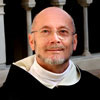
|
||
Based
on a TIME magazine regular feature,
interviews with influential Dominicans appear occasionally on DomLIfe.org November 24, 2008
1. What do you understand to be the role of the Lay Dominicans in the mission of the Order? Being members of the Dominican Family, that they dare more and more using their function as real members. St. Paul (cf. Ro 12.5) already exhorted the early Christian community at Rome not to regard each other less or more important within the body of Christ. So the Lay Dominicans are not the appendix of the Friars Preachers nor the outer "nice decoration" surrounding the face of our Order. It vitalizes the whole Dominican organism when all arms, legs, feet and fingers are activated. ‘Brain’ and ‘muscles’ have to work together ( - without reserving the role of the ‘brain’only to the friars and theologians!). 2. From your travels, tell us how the Lay Dominicans are preaching in the various cultures of the world? In my travels this year, visiting 19 different countries, I am deeply impressed by the variety of contemporary Lay Dominican ‘pulpits’. Sometimes already in good collaboration with the Friars, Sisters and Nuns, the Lay Dominicans respond through their own typical vocation to the religious, spiritual and social needs of their respective societies. I think of Lay Chapters in Africa who take care of the refugees in migration and orphans, needy ‘on the way from Jerusalem to Jericho’, because of the political tribal conflicts. I mention the activities in Asia, in religious teaching for children, in hospitals for the sick and homes of the eldery poor people. I admire the courage of Lay Dominicans taking part as preachers at the daily Gospel reflection on the U.S. Dominican Preaching website. Not to forget the grandmothers and grandfathers who preach by keeping in loving contact with those ‘lost’ daughters and sons who don’t any more practice their faith, being catechists and faithful examples for their grandchildren. 3. How, do you think, might the Friars, Sisters, and Lay Dominicans collaborate more effectively and actively? A good opportunity for our Dominican Family are the “Jubilee Novena”-Years until 2016 - commemorating 800 years after the official confirmation of our Order by Pope Honorius III - as a challenge for renewal of our vocation as Preachers in the spirit of St. Dominic. The Jubilee Novena started already two years ago with the reflection about contemplation as an essential element in our respective branches, lived exemplarily by the Nuns. Starting always at the Feast of Epiphany, this year is dedicated to the Holy Rosary. Next year will be stressed on the person of St. Dominic as ‘Preacher of Grace’. A Dominican Family team, representing Friars, Sisters, Nuns and Lay Dominicans, could prepare concrete guidelines for projects on provincial and national levels to renew more intensively as well as bundle more effectively the single flames of our common vocation into one torch. 4. What is keeping us from that collaboration now? A very good question: How to avoid also a pious ‘instrumentalisation’ of
the Lay Domincians by the Friars and Sisters? In a family, the
different members educate each other by sharing their experiences.
So also the Lay Dominicans are not objects of a one-way formation
by the religious branches. The Friars and Sisters are also the
learners, formated by the Lays’ experiences of profession,
social situation, conditions of life outside the priories and convents,
where they are the experts. By that experience, the organizational
structures are changing. A good example was the presence of the
Master of the Order, Fr. Carlos, the local Prior Provincial and
the Promoter General at the International Congress of Lay Dominican
Fraternities/Chapters at Buenos Aires in March 2007. We were very
welcomed guests - encouraging, supporting, clarifying, when necessary.
But not one of us friars was involved in deciding about the contents
of the Resolutions. My advice would be: Not to withdraw from their parishes, but to
be involved, as far as possible, in the liturgical and pastoral
parish activities. The best example is the involvement of Lay Dominicans
in Vietnam. There are 103 000 (!) professed Lay Dominican in that
communist country. They have their daily prayers from the Dominican
prayer book in their parish churches, are in their formation supported
by the parish priests and the bishops who recognize the four Dominican
pillars as supporting the evangelization and Christian apostolate
within their respective regions. During my visit to South and North
Vietnam last April, I learned how effective cooperation can
be -- not only within the different branches of our Dominican
Family -- but also with diocesan structures. Surely also the ‘rough
wind’ from the communist government keeps the Vietnamese
catholic community together. But also in many other parts of the
world the Christian faith does not regulate the common sense. So
we sisters and brothers of our Order should keep being Dominican within
and not apart from the Church. As I am neither the ‘superior’ nor the ‘inspector’ of
Lay Dominicans worldwide, I usually accept visits where I
am invited. My intention during my stays, preferably during conferences
where a number of delegates meet: is to learn from the conditions
they live their Dominican vocation; to inform them about the situation
in other places and countries and to encourage better cooperation
within the Dominican Family. So I could join already this year
the Interprovincial Council of the Lay Chapters of North America
having met near Detroit MI, as well as the Chapters around Washington
DC and the Norfolk MA – prison Chapter. Unfortunately it
was not possible for me to accept an invitation of the Dominican
Associates for the Sisters of Akron and Colombus to their annunal
meeting at the end of October. But I am very interested coming
in closer contact with the many members of our Dominican Family
associated to the sisters. It is not at all a matter of goodwill
but of coordinating the possible date! In any case, I am highly
interested in intensifying our Dominican relationship with the
USA Lay Dominicans within the next few years. Spontanously I would say: “Read one of the books of the
biblical Prophets!” Because there you find exciting examples
of a typical preaching vocation, really a ‘thriller’,
describing what can happen when listening to God’s surprising
vocation. Sometimes hesistating, coming into conflict with religious
and political authorities, but not giving up, being driven and
encouraged by what St.Paul long time later formulated: “Woe
to us if we do not preach the gospel!”( 1 Cor 9.16). That
exclamation, by the way, will accompany us Dominicans as the General
Theme for the Jubilee Years 2009-2016. As a German, I am not so
well informed about recent American literature. But as a contemporary
book I would recommend “The New Wine of Dominican Spirituality” of
our brother Paul Murray OP. Reading that book, we are reminded
very well again of the joy being Christians within the Order of
St. Dominic. I already got an invitation to dine with a person, deceased and
living: Jesus! That will be a big party I am highly motivated to
join! Because there I will meet – hopefully – all those
who I am interested in sharing that dinner. In the meantime for
me every simple or extraordinary actual dinner invitation is an ‘appetizer’ to
that great banquet. Am I too unpolite in my choice? I hope not.
Because my answer to your fictive question will become once reality! David: My pleasure. | Papal Address to Laity Council Lay
Dominican Congress |
|
subscribe to
DomLife.org and receive a free email update every two weeks. unsubscribe |



